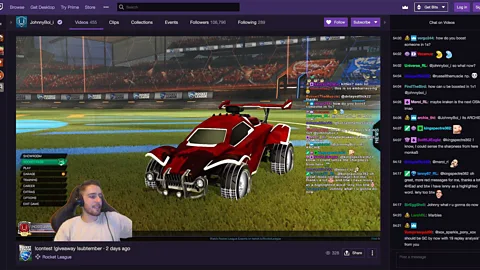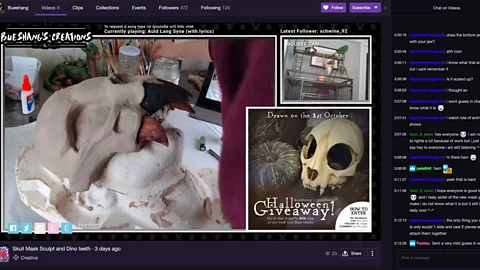The online stars living on some pretty generous tips
There is nothing better than getting stuff for free. One-way transactions - free cheese samples at the supermarket or complementary website trials - feel like taking your shoes off after a long day of work. Satisfying, guiltless.
And why wouldn’t they? Researchers say rational people aim to pay as little as possible for goods and services. Rationality can blur, of course, during shopping bonanzas like Black Friday but the essential idea remains the same. Why waste money on something you can get for free?
And yet around the world tipping culture persists. It funnels extra money to restaurant staff, concierges, hairdressers, nail technicians, drivers and more. These handy bonuses come from generous or embarrassed customers in exchange for good service. This culture has entered a new era.
For young entrepreneurs on the online live-streaming platform Twitch whose job it is to film themselves playing video games for live spectators, tips are everything.
Thousands of these e-entertainers make a comfortable living this way. At the top end, where daily audiences can reach hundreds of thousands, the voluntary payments for tournament wins or speed-run world records can even help make them multi-millionaires.
This tendency of anonymous viewers, who receive virtually no tangible returns for their donations, reveals a complex psychological culture behind the blossoming platform. By connecting with viewers, these self-starters have persuaded a fanbase who could just as easily watch for free to pay for their time.
 Twitch.tv
Twitch.tvTipping 2.0
Twitch was founded as an offshoot of Justin.tv, a website that allowed anyone to present live video of themselves to an interactive audience. Due to staggering growth from the video game streaming section, Twitch accepted an acquisition bid from Amazon for $1bn (£763m) in 2014.
What began as an intimate community has since transformed into a mainstream arena for entertainers and their spectators. In July 2018, Twitch viewers streamed a collective 775 million hours of video - more than twice that of YouTube’s live-streaming branch. More than one million viewers are watching Twitch at any given moment and over three million unique broadcasters go live every month. To put this in context, the biggest TV shows in the world attract around 18 million viewers.
Twitch streams usually look similar. The game fills the entire window and the player’s face occupies one corner. A feed of comments and questions from viewers scrolls continuously down the right side of the screen and the streamer responds through a microphone while they play. If a viewer subscribes - signing up for a monthly payment plan split between the streamer and Twitch - a large notification will pop onto the screen. The streamer will usually thank the subscriber and encourage viewers to shower them with emoticons. Subscribers generally gain access to exclusive emoticons, a unique badge next to their name and, best of all, a live shout-out from the streamer.
Subscriptions are capped at $25 (£19) a month, with the majority at the standard $4.99 price tag. Tips, on the other hand, are unlimited. With just a few clicks, viewers can fling hundreds or thousands of dollars at their favourite streamer, usually resulting in an over-the-top reaction onscreen.
“They want streamers to shout, to scream, to thank them,” says Ali Moiz, CEO of tipping software company Streamlabs. “I’ve seen girls cry. We’ve seen people fall out of their chairs. We’ve seen people do push-ups when they make 100 bucks.”
Moiz, whose company has processed $257m in tips since 2014, says donors want to be acknowledged. “They want recognition from their favourite streamer, like ‘I am not anonymous, I am not a nobody, I exist’,” he says. “That’s why some people give insanely large donations. Some spend $100,000 a year.”
A career as a streamer
For streamers, success is determined by their work ethic and insight into their fans. They have to understand their audience well enough to create the specific content that will pay the bills.
Rather than play his own games, John “JohnnyBoi_i” MacDonald provides analytical commentary of the football-like game Rocket League. He attracts between 800 and over 2,000 viewers whenever he invites pro-players to compete on his channel while he commentates from his home near Glasgow, Scotland.
“A lot of people use that as a way to get a question across or sometimes a joke,” he says. “That’s when it can become a donation war between several viewers all competing to be the top contributor.”
According to Moiz, most steady streamers earn roughly the same from donations as they do from their subscribers. Giving fans the option of tipping, in addition to cultivating a subscription base, is certainly in their best interest. It’s easy, however, for viewers to misinterpret the transaction. “Fans want to be a part of their favourite celebrity’s world,” Moiz says. “So they are paying to feel closer. I think the idea that they’re just doing it out of support is not what we see.”
Michael Lynn, a professor of food and beverage management at Cornell University and a leading expert on tipping, describes three of the most significant factors that motivate people to tip - referencing a study by Marcus Kunter in the Journal of Business Research - as income, perceived level of fairness and avoiding feelings of guilt.
Income is easy to understand. The wealthier someone is, the less pain they feel parting with cash. Fairness, however, is a much more subjective measure. People feel distress when the benefits they give and receive in their relationships are not proportional to one another, Lynn writes. So the desire to avoid psychological distress makes many people to want to repay favours - in this case, hours of free entertainment.
MacDonald, the Rocket League commentator, says some Twitch viewers think of the site as a cheaper alternative to, for instance, going to the cinema. “Twenty hours of cinema-viewing could be £150 ($199), so someone donating £150 to a Twitch streamer who provided them with 20 hours of content could be looked at as an acceptable exchange,” he says. For many viewers, the “distress” of watching hours of free entertainment eventually leads to a need to give something back.
The most obvious sign of a guilty Twitch viewer comes as a written apology attached to their tip. Something like: “I’m broke right now. Sorry I can’t give more.”
Some streamers are keen to abuse this guilt, MacDonald says, and will purposely target their viewers for more money to help pay rent or bills. He condemns this as childish. “If they need more money then maybe they should get a part-time job and tell their viewers they might be streaming less.”
Jaime Bickford, the top female professional player in Rocket League, receives tips ranging from $1 to $1,000 when she streams her own gameplay. She has regulars who watch every time she goes live, creating a family atmosphere in the chat.
As a female broadcasting from a male-dominated website, Bickford still runs into rudeness and sexism. But her fanbase is self-policing: Her loyal viewers often step in to moderate the chat for her, deleting nasty comments and banning anyone who crosses the line. The relationship is give-and-take.
“I’m myself all the time, I’m very open. I stream from my bedroom, so they’re literally in my bedroom with me,” Bickford says. “I just like including people in my life. It can be hugely supportive.”
While video game channels are the most popular, Twitch hosts thousands of entertainers with other live-streaming interests. Lauren Kirkham of Victoria, Australia, who goes by the name “Bueshang”, constructs anatomically-accurate skull masks live on stream.
Twitch is not her primary source of income - she makes most of her money selling the masks as costumes or art pieces - so receiving tips isn’t her priority. But she enjoys using the platform to chat to customers while she works. Her audience motivates her to keep at it into the night when she has projects to finish. Without their support and company, Kirkham says she wouldn’t get nearly as much done.
 Getty Images
Getty ImagesA crowded market
Streamers with smaller audiences can cultivate simpler and more intimate relationships with viewers. But a different kind of subculture simmers on the biggest channels, where viewers compete to get the streamer’s attention. The constantly updating donation list on Twitch’s most popular channels often scrolls too fast for streamers to keep up. It takes a huge dollar amount to disrupt the show.
These tips attract recognition and praise from thousands of people, as well as propelling the donor to a higher rank in the Twitch social strata. Maintaining that status can be extremely important for those generous or wealthy enough to do so. The small icon next to their name that evolves as they renew their subscription for consecutive months serves almost as a flashy piece of jewellery. Having your name high up on the “all-time top donators” leader board? It’s like driving around a sports car.
Viewers take notice of the amount others spend and often pay their respects in the chat. Much in the same way people with popular social media posts receive “likes”, big spenders on Twitch carry a noticeable amount of clout. Unlike the real world, however, that clout vanishes as soon as the stream ends and everyone steps away from their computers.
Whether they tip out of love, guilt or their own ego, the result is the same for the streamers. Even at 25, Bickford can begin thinking of prospects usually reserved for late-career professionals. In a few years, once she feels she’s accomplished everything she can in her eSport, she hopes to step over to the other side and purchase her own team.
Until then, she will keep saving money and looking for investment opportunities. Like thousands of other Twitch streamers whose dreams of finding success through the platform once seemed unreachable, her fantasy has become real - thanks, in part, to tips from her fans.
“I have no school debt and I’m saving money to hopefully buy a house soon,” she says. “It’s changed my life.”
--
To comment on this story or anything else you have seen on BBC Capital, please head over to our Facebook page or message us on Twitter.
If you liked this story, sign up for the weekly bbc.com features newsletter called "If You Only Read 6 Things This Week". A handpicked selection of stories from BBC Future, Culture, Capital and Travel, delivered to your inbox every Friday.



Post a Comment